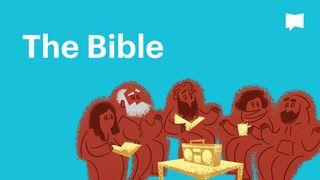The Bible with Nicky and Pippa Gumbel, Classic Version, 2017Sample

There Is a God and He Is Great
I studied and practised law for nearly ten years. In every legal case, evidence is vital. Evidence matters to me. I could not be a Christian if I did not believe that our faith is based on compelling evidence. There is good evidence for the life, death and resurrection of Jesus Christ.
Over recent years, there has been a spate of books by the ‘new atheists’ suggesting that there is no evidence for God; that God is a ‘delusion’ (‘The God Delusion’) and that ‘God is Not Great’ (the title of another of these books). While of course, the Bible does not try to provide a scientific proof for the existence of God, it does point to the evidence of ‘eye-witnesses’ (2 Peter 1:16) and proclaims that ‘there is a God in heaven’ (Daniel 2:28) and that ‘the Lord is great’ (Psalm 135:5).
There is good reason to put your trust in God. You will grow in faith as you study the truth of God’s word and boldly proclaim that ‘there is a God’ and ‘he is great’.
Psalm 135:1–12
1. Proclaim the greatness of God
‘God’s so good’ (v.3, MSG). This is the claim of the psalmist: ‘The Lord is great’ (v.5). He remembers God’s relationship with his people (v.4). He sees the world that God created and sustains (vv.6–7), and he testifies to God’s wonderful protection (vv.8–11). This range of experience and evidence underpins his belief in the greatness of God.
Respond to God’s greatness in worship. Again and again the psalmist calls us to ‘praise the Lord’ – a call that is repeated, in various forms, five times in the first three verses. Praise the Lord!
Lord, today I want to praise you and worship you. I trust you with my life again today.
2 Peter 1:1–21
2. Proclaim the truth of God’s word
If you want a closer relationship with God, put time aside to develop the relationship. Spend time with him. As you study his word, your faith grows and your life is changed. The strength of all relationships, including your relationship with God, depends on communication.
In his letter, ‘Simon Peter, a servant and apostle of Jesus Christ’ (v.1), writes about his ‘faith’ and the faith of his readers ‘whose experience with God is as life-changing as ours’ (v.1, MSG).
Your faith is precious (v.1). ‘Grace’ and ‘peace’ (v.2) are two of the most precious things you can ever experience in life. Peter says that they are yours ‘in abundance through the knowledge of God and of Jesus our Lord’ (v.2).
This is not an irrational faith. It is ‘the truth’ (v.12). Some people today think that the Bible is full of ‘cleverly invented stories’ (v.16). But Peter writes, ‘We did not follow cleverly invented stories when we told you about the power and coming of our Lord Jesus Christ, but we were eye-witnesses of his majesty’ (v.16). Peter is talking particularly about the transfiguration (vv.17–18), when he witnessed the revelation of Jesus’ glory and identity (see Mark 9; Matthew 17; Luke 9). He testifies, ‘We saw it with our own eyes’ (v.16, MSG).
A witness is a word used for someone who gives evidence in a court of law, and the evidence about Jesus is more akin to legal evidence than mathematical or scientific proof. There is evidence from eyewitnesses. Faith is not irrational. It is based on what they saw. Peter asserts, ‘We couldn’t be more sure of what we saw and heard’ (2 Peter 1:19, MSG).
Peter also reminds them of the power and trustworthiness of Scripture: ‘The main thing to keep in mind here is that no prophecy of Scripture is a matter of private opinion. And why? Because it’s not something concocted in the human heart. Prophecy resulted when the Holy Spirit prompted men and women to speak God’s word’ (v.21, MSG). The Holy Spirit still speaks through these words of Scripture, and as you experience his presence and power through them, they reinforce the truth of your faith.
Faith is not just a set of ideas – it changes the way you live your life. Peter explains that through the Holy Spirit ‘[God’s] divine power has given us everything we need for life and godliness’ (v.3).
In light of this he explains that you need to ‘complement your basic faith’, and then Peter lists various qualities you need to seek to develop – ‘good character, spiritual understanding, alert discipline, passionate patience, reverent wonder, warm friendliness, and generous love, each dimension fitting into and developing the others’ (vv.5–7, MSG). These things will keep you from being an ineffective Christian (v.8), and help you to remain strong in your faith until the end (vv.10–11).
God, thank you that our faith is based upon the solid testimony of eyewitnesses and upon our experience of a relationship with you. Help me to grow in that relationship as I trust the truth of your word.
Daniel 2:24–3:12
3. Proclaim that ‘there is a God’
Refuse to conform to the standards of the world. Have the courage to proclaim that ‘there is a God’ in spite of what others may be saying and doing.
I once knew a godly man nicknamed ‘Gibbo’ who, when he was young, worked as a clerk at Selfridges, the London department store. One day, when the owner Gordon Selfridge was there, the telephone rang and Gibbo answered it. The caller asked to speak to Gordon Selfridge. Gibbo passed on the message and Selfridge replied, ‘Tell him I’m out.’ Gibbo held out the receiver to him and said, ‘You tell him you’re out.’ Gordon Selfridge took the call, but was furious with him. Gibbo said to him afterwards, ‘If I can lie for you, I can lie to you.’ From that moment onwards Gordon Selfridge had the highest regard for and trust in Gibbo.
Daniel and his three friends believed that ‘there is a God’, and therefore they refused to compromise. By their lives and their lips they boldly proclaimed, ‘there is a God’.
Daniel was convinced that ‘there is a God in heaven’ (2:28), and this conviction underpins both of the stories in today’s Old Testament passage. In chapter two we read of Daniel’s conviction that this God ‘reveals mysteries’ (v.28), and his willingness to act on that belief. In chapter three, we see his three friends willing to risk death because of their conviction that God exists, and their commitment to worship him alone.
Daniel was humble enough to recognise that the interpretation had been given, not because of his wisdom, but because of the grace of God (v.30).
God told Nebuchadnezzar three things, which are true for you also (vv.36–38): First, all you have has been given to you by God. Second, God has placed you in the position that you are in. Third, God has made you who you are.
There is no cause for pride, arrogance or self-satisfaction. Your abilities, gifts and resources are all given to you by God.
Daniel continued to interpret the dream: There will be a succession of kingdoms (probably Babylonian, Medo-Persian, Greek under Alexander the Great and Roman). The key point though is that all the empires of the world – be they Babylonian, Roman, British, Soviet, American or Chinese – all come to an end. None are eternal.
Daniel then spoke of a kingdom that will never be destroyed but will endure forever (v.44). This kingdom is based on the rock cut out of a mountain not of human hands (v.34), a rock that broke the iron, the clay, the bronze, the silver and the gold to pieces (v.35).
This rock ‘struck the statue’ and ‘became a huge mountain and filled the whole earth’ (v.35). Now, through the lens of Jesus, we see that the rock is Christ (see Isaiah 28:16; 1 Peter 2:4–8; Psalm 118:22–23). He had divine origin. He was the Son of God (‘a rock was cut out, but not by human hands’, Daniel 2:34). His kingdom has seen phenomenal growth (‘filled the whole earth’, v.35).
There are now well over two billion people in the world who profess the name of Jesus. His kingdom has an eternal quality (v.44). It is, ‘The eternal kingdom of our Lord and Saviour Jesus Christ’ (2 Peter 1:11).
Daniel’s own position was achieved, not by worldly ambition but by divine intervention on behalf of someone whose aim was simply to obey God rather than human beings. He didn’t seek or crave human affirmation like the magicians of Nebuchadnezzar’s court, but knew his Father and sought his pleasure.
Daniel, Shadrach, Meshach and Abednego remained committed to God and were ready to die for their beliefs (Daniel 3). They were willing to stake everything on the fact that there really is a God and he is great.
Lord, help me to proclaim to the world, by my life and my lips, that there is a God and that you are great.
Pippa Adds
2 Peter 1:5–8
If we don’t want to be ‘ineffective and unproductive’ in our faith, we need to keep adding more: more knowledge, self-control, perseverance, godliness, kindness and love. We should never be satisfied by where we are, but always seeking an ‘increasing measure’.
About this Plan

Start your day with the Bible in One Year, a Bible reading app with commentary by Nicky and Pippa Gumbel. Nicky Gumbel is the Vicar of HTB in London and pioneer of Alpha. 'My favourite way to start the day.' - Bear Grylls, Adventurer
More
We would like to thank Nicky and Pippa Gumbel, HTB for providing this plan. For more information, please visit: https://www.bibleinoneyear.org/
Related Plans

The One Year® Chronological Bible

ICA - 365 Daily Kingdom Living

The Greatest Gift

C.S. Lewis And The Call To Create

BibleProject | The Bible

Choosing Each Day: God or Self?

Discerning The Voice Of God

Through My Father's Eyes

Unshakable Hope: Building Our Lives On The Promises Of God
